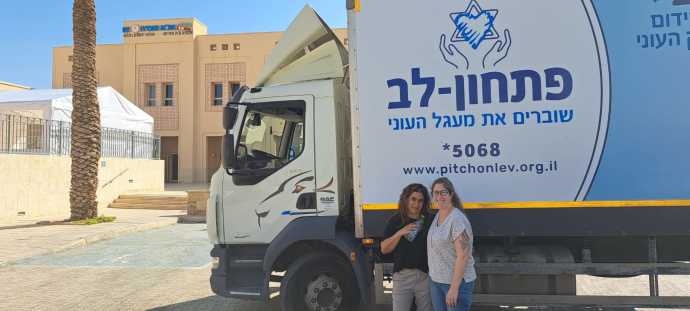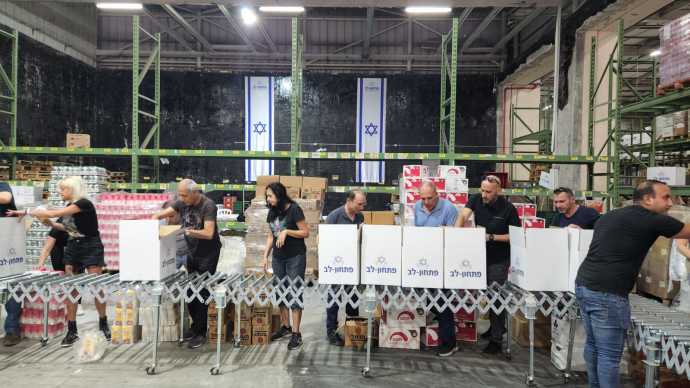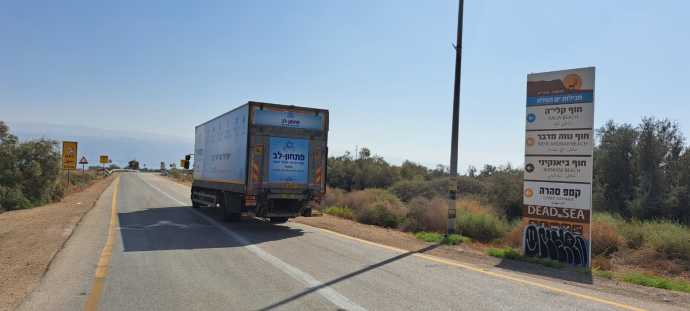On Saturday, October 7, a war broke out in Israel after thousands of terrorists from Gaza infiltrated the southern part of the country while firing the heaviest rocket barrages that the state has known since its foundation. The attack led to the murder of over 1200 Israeli citizens.
While the State of Israel struggled to provide aid and quick and accurate solutions on the home front, civil society organizations took immediate action.
On the very same day the war began, Pitchon-Lev (“Open your heart”) started to assess the situation and figure out how to help the citizens of the south and the security forces.

“On October 8, our trucks were already in the Gaza border communities, bringing everything people needed,” said Pitchon-Lev CEO Eli Cohen.
Since then, Pitchon-Lev has been one of the organizations standing at the forefront of the Israeli home front, providing food, equipment, and support for the families evacuated from their homes, ranging from educational activities for the children to assisting citizens in understanding their rights.

“We have experienced many crises, the coronavirus pandemic, Operation Protective Edge, other moments of conflict,” Cohen said. “We know that in a situation of emergency, we need to be ready to fulfill all the needs, whether it is the needs of the evacuees or of the security forces personnel.”
“It is important to remember that we are a field organization, in direct contact with those who need assistance and that our approach is always holistic,” he added.
Pitchon-Lev was established in 1998 with the idea of not simply providing food to the poor but rather working on breaking the cycle of poverty in the State of Israel.

In the organization’s view, food security is only an initial step in finding long-term solutions. To this end, Pitchon-Lev has been the first to raise the plight of the poor to the top of the public agenda in the country.
The organization operates on several levels.
In the short term, families in need receive weekly food parcels, clothes and assistance in exercising their rights to receive all the support they are entitled to from the state.
Additional programs include “Lehetiv” (“to do good’), run in Pitchon-Lev facilities around the country, that helps families facing financial difficulties find practical and emotional support to overcome the challenges.
Another program, “Zchut Bekalut,” (“Rights in a Click”), carried out in cooperation with the National Insurance Institute and the UJA – Federation of Greater Toronto, ensures that individuals in need receive access to what they are owed by the welfare system at no charge.
Pitchon-Lev also offers a special track for young Israelis from disadvantaged backgrounds.
“Program 7” enrolls at-risk youth from the social and geographic periphery in Israel beginning in the 10th grade and lasting over seven years to cover the most crucial period for every adolescent in shaping their professional and personal future - three years of high school, three years of military service and the year after discharge.
A similar opportunity is also offered in the Arab sector with the “Hamsa Program” with the goal of optimal integration of Arab youth into Israeli society and a focus on supporting them over the course of five years as they go through high school and then university, vocational training, or as they look for employment.
“We work with all Israeli sectors, Jews, Arabs, Ultra-Orthodox and for each community we adapt our activities according to their needs while maintaining a holistic approach,” Cohen said. “If we think of a food parcel for an Arab family, is very different than one for an Ultra-Orthodox family.”
Pitchon-Lev has also been active at the policy level, spearheading the Pitchon-Lev Law for the Fight against poverty, which recently passed the Knesset’s first reading, with the goal of moving away from the definition of poverty that only encompasses access to food to introduce one that includes a more comprehensive approach. The bill also requires the establishment of a national authority to fight poverty, tasked with coordinating the work between different ministries and fulfilling the vision for a national strategy to break the cycle of poverty.
“What differentiates us from other organizations is that people who receive help from us at the end of a certain period of time do not need us anymore,” he said. “One out of four families assisted by Pitchon-Lev leaves poverty behind in less than a year.”
After October 7, Pitchon-Lev quickly understood that beyond continuing to assist some 160,000 citizens in their rise from poverty, it needed to be in the field for tens of thousands of additional Israelis in need, people who were displaced, traumatized and left with very little.
Within a few days, the organization established a new 3000-square-meter emergency logistics center.
In the following weeks, Pitchon-Lev was appointed by the Knesset as the official organization for its members to collect donations after 88 MKs requested it emphasizing its extensive experience, infrastructure and expertise.
“MKs from all political parties have received approval from the attorney general to receive donations on behalf of Pitchon-Lev,” said Cohen. “At the same time, we take care of all the requests for help that are sent every day. For example, an elderly lady from Kibbutz Kfar Azza in the south needed a scooter. The terrorists killed or kidnapped everyone in her family and burnt the scooter that she was using. Within hours, we provided a new one in the hotel where she is housed.”
In the past two months, Pitchon-Lev has distributed over 60,000 food baskets, more than 50 tons of equipment, 14,000 boxes of formula and diapers for babies, about 7,000 hygiene and toiletry kits and some 8,000 ready meals for the benefit of displaced Israelis from the communities in the south and in the north.
Every day, volunteers from all walks of life, from Israel and from abroad, individuals as well as groups from companies, local authorities, and other organizations, come and support Pitchon-Lev’s activities.
As an organization whose fundamental goal is breaking the cycle of poverty in Israel, Pitchon-Lev has initiated or has been a partner in several additional projects that look at the medium and long-term solutions to provide a holistic response, connecting the field with those in need of assistance.
The program supporting people in understanding what their rights are and ensuring that they receive what they are entitled to has been significantly expanded. Approximately 200 additional volunteers are available to the public in order to make sure they take advantage of all the rights and services related to the security situation in the fields of work and employment, physical and mental health, damage to property and more.
Since the hotline was expanded, Pitchon-Lev has been able to ensure assistance for the value of approximately three million shekels for the citizens in need. In addition, the organization felt it was imperative to offer displaced Israelis the opportunity to receive the service in person and has dispatched several professionals to the hotels and other facilities where they relocated, in cooperation with the Ministry of Social Affairs and the JDC (the American Jewish Joint Distribution Committee).
“We had a woman who was in a dire financial situation, who left her house with nothing,” Cohen shared. “After she asked for help, it emerged that she was entitled to receive NIS 43,000.”
The educational programs run by Pitchon-Lev throughout the year also needed to be adapted to the new reality, with the aim of preserving the important multi-year process as part of the organization’s holistic activity.
Despite schools remaining closed for long periods in large parts of the country, and children who were evacuated being reassigned to different facilities, the coordinators of the youth programs continued to be in direct contact with the participants.
“At our center we are receiving support and assistance from all over the world,” Cohen said. “I call it ‘the place that restores faith in humanity’ because after what we saw and experienced on October 7, every day we can see people who come to volunteer from across the globe, from the US and Canada to Fiji and Taiwan to Morocco and Costa Rica. Witnessing this kind of support is heartwarming.”
>> To learn more and donate - click here
The article was written in cooperation with Pitchon-Lev.
